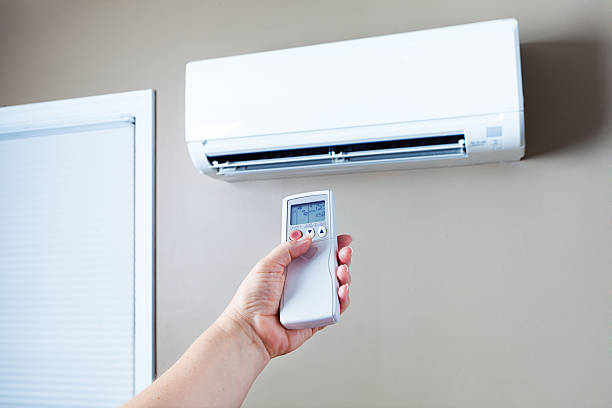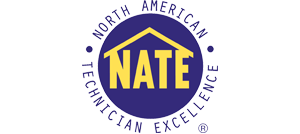
Have you ever found yourself asking the question, “Why is my air conditioning on but not making my home any cooler?”
You come home from work on a sweltering summer day, expecting a cool, welcoming environment, only to be greeted by warm air circulating through your house. Not only is this frustrating, but it also indicates that something’s amiss with your AC system.
Let’s first explore why your AC might be working overtime without the chill effect. From there, we will explore some troubleshooting tips and when it’s time to call in professionals to fix AC unit.
Common Culprits Behind the Lack of Cool Air
- Dirty Air Filters:
Over time, air filters can become clogged with dust, pet hair, and other debris, which can obstruct airflow and hinder the cooling process. - Thermostat Issues:
Sometimes the problem is as simple as incorrect thermostat settings. Ensure it’s set to ‘cool’ and not ‘fan only.’ - Frozen Evaporator Coils:
When airflow is restricted, your evaporator coils can freeze, disrupting the AC’s ability to cool air. - Low Refrigerant Levels:
Refrigerant is essential for absorbing heat from the air. If your system is low due to leaks, it won’t cool effectively. - Faulty Condenser Fan:
The condenser fan expels heat from your home. If it’s not working correctly, your system will struggle to cool.
Troubleshooting Tips
Before concluding that professional air conditioning repair is necessary, there are a few things you can check:
- Ensure your thermostat is correctly set and operational.
- Replace or clean your air filters to ensure unobstructed airflow.
- Check outdoor units to ensure they’re not obstructed or dirty.
- Inspect the indoor evaporator coil for signs of freezing, and allow it to defrost if necessary.
When to Call in the Pros for AC Air Repair?
Sometimes, despite your best efforts, the issue persists. Here’s when you should consider professional help:
- Persistent Warm Air: If your unit still blows warm air after troubleshooting, a deeper issue might be at play.
- Strange Noises or Smells: Unusual sounds or odours can indicate major problems that require professional attention.
- Frequent Cycling: If your unit turns off and on more frequently than normal, it might be struggling to maintain temperature, indicating a need for home AC repair.
- High Humidity Levels: An efficiently working AC also reduces humidity. Excessive moisture might suggest it’s time for a check-up.
Benefits of Professional Air Repair Air Conditioning
Opting for professional repair can offer several advantages:
- Expert Diagnosis: Professionals can quickly identify and resolve complex issues that might not be apparent to the untrained eye.
- Warranty Preservation: DIY repairs can sometimes void warranties. Technicians ensure that your repairs are compliant with warranty conditions.
- Long-Term Solutions: Professionals don’t just fix the symptoms but address the root cause to prevent future breakdowns.
- Safety: Air conditioning systems involve electricity and refrigerants that can be hazardous. Technicians have the necessary training to handle these safely.
Troubleshooting Other Issues
Sometimes the problem arises from something that we least expect. Aside from the common causes discussed earlier, a few more culprits could be preventing your AC from cooling adequately.
Drainage Issues: You might have overlooked this, but your AC has a condensate drain that removes the moisture from the air in your house. Over time, algae and mold can develop and clog the drain line or the drain pan could get full causing water to back up. While most modern systems shut off in such cases, older units might remain operational but with compromised cooling efficiency.
Circuit Breaker Trips: AC units have built-in safety measures to prevent overheating. Among these is a circuit breaker that trips when the unit is overworked or if there are electrical issues. If you’ve noticed your AC turning on and off or if it’s not coming on at all, checking the circuit breaker could shed some light.
Old AC Units: AC units aren’t meant to last forever. The average life expectancy is around 15 to 20 years. Often, older units start losing their efficiency, and you might notice that they’re running but aren’t cooling your house as well as they used to. In such a case, upgrading to a newer model might be the most practical and energy-efficient solution.
Wrapping Up!
If your AC is running but not cooling, the fix might be something as simple as changing a dirty filter or as complex as repairing a refrigerant leak. While some quick fixes can be DIY, some problems require the skilled hands of professionals.
Aside from that, investing in energy-efficient AC units is a great way to reduce your energy consumption and save you money in the long run.
If troubleshooting doesn’t resolve the issue, it might be time to contact a trusted professional. You should consider getting Commercial Heating Installation Service from a reputable provider that can ensure your home returns to being the cool sanctuary it should be.










